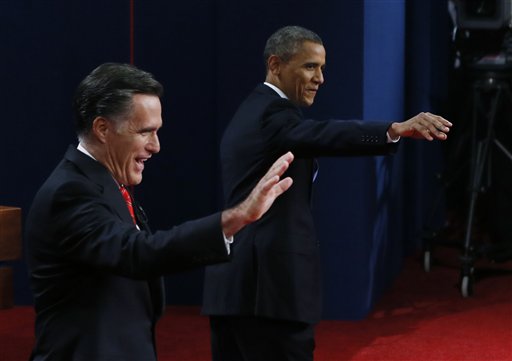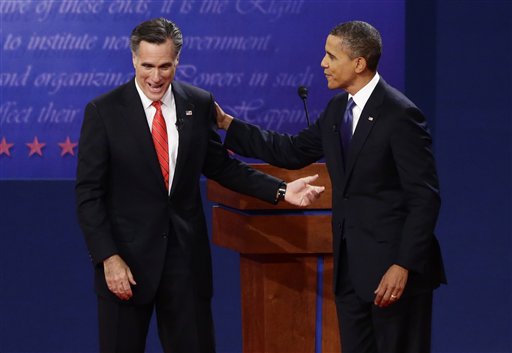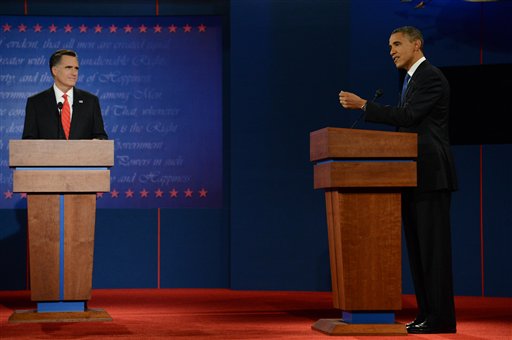DENVER — Little more than a month from Election Day, Republican Mitt Romney is barreling out of the first presidential debate energized by a solid performance that telegraphed his determination to take it to President Barack Obama with gusto. The president, intent on keeping his momentum from stalling, is warning that his GOP rival’s policy prescriptions for a fragile economy are more fantasy than reality.
Standing toe-to-toe with the president for the first time in the campaign, Romney held his own and more at a time when there already were signs that the race is tightening in some of the battleground states where Obama has enjoyed an advantage. Obama kept his cool and signaled that he won’t let up on his message that Romney’s plans on taxes, health care, the deficit and more just don’t add up.
“It’s fun,” Romney declared well into Wednesday night’s 90-minute faceoff, clearly relishing the back-and-forth.
“It’s arithmetic,” said Obama, hammering at Romney’s conspicuous lack of details with far less enthusiasm.
After a few days of relative calm as the candidates prepared for the first of their three debates, the campaign now bursts out of Colorado in all directions Thursday, with an itinerary that touches down in some of the most hotly contested battleground states in the coming days: Obama campaigns in Colorado and Wisconsin, then on to Virginia and Ohio. Romney and running mate Paul Ryan are off to Virginia, then Romney spends more time in Virginia before moving on to Florida. Vice President Joe Biden is bound for Iowa.
But before leaving Colorado, Romney brought in some more campaign cash to fund the final push. He went to a mansion located on the Cherry Hills Country Club south of Denver, where a Bentley and other luxury cars were lined up for a private breakfast with donors who contributed at least $50,000. Their money will help fund Romney’s current advertising gap in the final weeks, putting out messages like the ad his campaign revealed Thursday in which the candidate wore an open-collar shirt on a factory floor and outlined his job creation plan.
With a 13-day break before their next debate, Obama and Romney have time to hone their arguments while their campaigns continue to bombard the most hotly contested states with negative ads that go far beyond the more restrained jibes the candidates leveled from their respective podiums. Obama made no mention, for example, of Romney’s caught-on-tape remark that he’s not worried about the 47 percent of Americans who don’t pay federal income taxes. Democratic ads, though, have been making hay with the comment.
Asked why the president didn’t raise the video, Obama senior political adviser David Axelrod suggested on MSNBC’s “Morning Joe” that he didn’t need to since it has been so widely seen and heard. “The president’s belief is that’s something that has been very much a part of the discussion,” Axelrod said.
In next few weeks, Romney is expected to give a number of policy speeches filling in details as he tries to sharpen the contrast with Obama while answering criticism that he hasn’t clearly outlined his plans. The Republican challenger begins with a foreign policy speech in Virginia on Monday. Subsequent speeches are expected to focus on his plans for job creation, debt and spending.
Romney has promised to balance the budget in eight years to 10 years, but hasn’t explained just how he’ll do it. Instead, he’s promised a set of principles, some of which — like increasing Pentagon spending and restoring more than $700 billion in cuts to Medicare over the coming decade — work against that goal. He also has said he will not consider tax increases.
Obama argued that it’s all too much.
“At some point, I think the American people have to ask themselves, is the reason that Gov. Romney is keeping all these plans to replace secret because they’re too good?” he said. “Is it because that somehow middle-class families are going to benefit too much from them? No.”
The president went on to say the nation faces tough problems that defy simple solutions and said his own choices were “benefiting middle-class families all across the country.”
Romney maintained it was Obama who was crushing the middle class and getting the numbers wrong, telling him, “Mr. President, you’re entitled to your own airplane and your own house, but not your own facts.”
The two candidates planted themselves behind wooden lecterns and faced off before about a crowd of fewer than 1,000 people at the University of Denver. But their policy-heavy debate really was aimed at the tens of millions of television viewers who tuned in, particularly those who are undecided or soft in their support for a candidate. Just the sort of voters who may be less partisan and more interested in hearing specifics.
Karl Amelchenko, an Obama supporter who watched the debate at a store-front art gallery in Raleigh, N.C., thought Romney did himself some good.
“I think he won, unfortunately,” Amelchenko said. “I think he might change some minds.”
But some voters still aren’t ready to commit one way or the other.
Cynthia Gerst, a state worker in Ohio who attended a nonpartisan debate watch party in downtown Columbus, confessed she’s “been under a rock, but now I’m ready” to pay attention. She leans Democratic, but hasn’t made up her mind.
“I couldn’t distinguish who was in the right,” she said after the debate.
Axelrod said on NBC’s “Today” show Thursday that the former Massachusetts governor had “big gaps in truth that we saw” and said that Obama will set the record straight. He charged that Romney “refused to offer any way to pay” for the broad-ranging tax cut he advocated.
“I give him credit for a strong performance. I give him an F for being honest with the American people,” Axelrod said.
Ed Gillespie, a top aide to Romney, said what people saw in the debate was a presidential challenger “who had a command of the facts.”
“He had a very fact-based critique of Obama’s policies,” Gillespie said on NBC, adding that “we didn’t hear very much, frankly, from President Obama about a second-term agenda.”
Both candidates came into the debate with distinct missions, and largely achieved them: Romney needed to project leadership and dispel the image of an out-of-touch elitist. Obama needed to avoid making any major mistakes and press the case that he still has more to offer.
The GOP nominee began his charm offensive from the outset, offering 20th wedding anniversary wishes to the Obamas and joking that the debate hall was quite the romantic setting. Then he quickly segued to the campaign’s central issue — jobs — and called it “a very tender topic.”
Obama sketched out his familiar agenda of improving schools, expanding energy sources, increasing tax fairness and paying down the debt, then made a simple but all-encompassing promise: “All of this is possible.”
Each candidate wielded studies and experts to buttress his arguments, and each hauled out anecdotes about ordinary people to connect with voters. Romney spoke of the woman in Ohio who grabbed his arm and told him she’s been out of work since May. Obama recalled the teacher he met in Las Vegas who had students sitting on the floor and using 10-year-old textbooks.
Biden and Ryan were probably two of the most attentive viewers: Their own debate is up next, on Oct. 11 at Centre College in Danville, Ky. Their rival rehearsals, with stand-ins for their opponents, already are well under way.
Obama and Romney go back at it on Oct. 16, in a town hall-style format at Hofstra University in Hempstead, N.Y. Their final faceoff, on foreign affairs, is Oct. 22 at Lynn University in Boca Raton, Fla.
Send questions/comments to the editors.





Comments are no longer available on this story